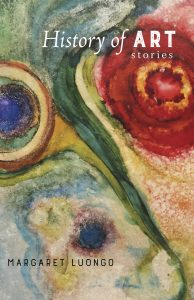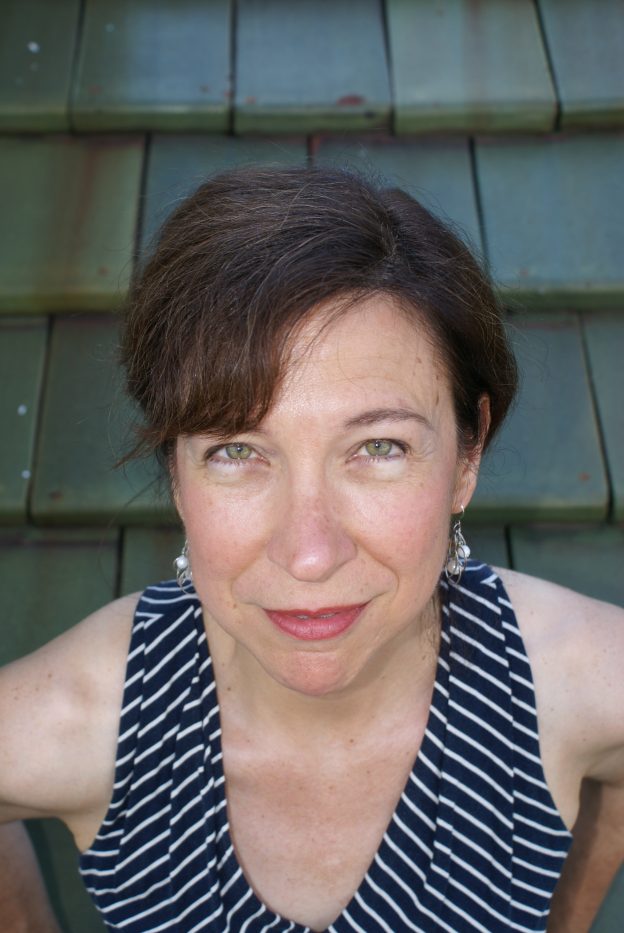To finish out this series, I interviewed Margaret Luongo, Director of Creative Writing, Associate Professor of English, and advisor for my apprenticeship with the CW program. Since my first (and regrettably, only) class with her, I have experienced just how wise and kind she is and I am very glad I got to work more closely with her as part of my apprenticeship, especially now that it is coming to close along with the rest of my college career. I’m very thankful that I have been able to work with Prof. Luongo over this past year, and I hope you all enjoy learning a bit more about her!
-Lauren Miles
Lauren Miles: How did you get started with fiction writing? Tell me about the people/institutions/etc. that supported you.
Margaret Luongo: I’ve been writing a long while and am fortunate to have had so much support it’s overwhelming to think about.
I credit my siblings for turning me toward storytelling, and my parents for giving us the dinner-table forum. My sibs are much older than I am and their stories gave me a window into the adult world I never would have had otherwise. They read to me and even wrote in my diary for me before I could do it myself. Our house was filled with their books and magazines, and my reading was completely unrestricted. I read things as a child that were totally and thrillingly unsuitable.
Before I went to graduate school Cathy Fink and Marcy Marxer, my bosses at Community Music, supported me by giving me time off and a flexible schedule to suit my writing needs—by taking seriously my desire to write. I’ll always be grateful for that. In fact, they hired me because I could write; I’d never worked in the music business and knew nothing about bluegrass and folk, but I certainly learned.
LM: What other creative artists have inspired the style of your work?
ML: I read Harold Pinter as an undergraduate my sophomore year (and then for comprehensive exams my senior year) and that experience blew apart the way I think of story. It was one of the happiest moments of my college experience. For a while I wrote terrible one-acts in the style of Pinter. I don’t recommend it! But I like this idea that a story needn’t give the reader a beginning, middle, and end—at least not in the way readers typically expect to be fed stories.
Studying visual art helps me think about form in a very associative way—more like immersion, definitely non-rational. Music and dance operate similarly for me.
I admire Robert Rauschenberg’s work ethic and views on aesthetics. He worked every day without judgment—just made things—and said “Anything you do is bound to be an abuse of someone else’s aesthetic.” That’s so important to remember. You can’t please everyone; don’t waste your time trying.
LM: What are you reading currently?
ML: Reading:
That We May Live: Chinese Speculative Fiction
How Buildings Learn, Stewart Brand
The Book of Jane, Jennifer Habel
Listening to: The Fun Stuff, James Wood (Here’s a link to the essay of the title.)
LM: For prospective students: how would describe your teaching style?
ML: I’m open to student interests and aesthetics. I want to help you be the best kind of writer you want to be, while showing you a lot of different styles and aesthetics. At the upper levels, I will push you to question and defend what you’re doing, while still respecting your choices, as long as you’re thinking about what you’re doing.
LM: What is the no. 1 thing you want Miami Creative Writing students to take with them or have learned by the time they graduate?
ML: Writing is a process, and creativity is a reward in itself. Sorry, that’s two things, both equally important for different reasons.
LM: And my favorite question: what is your least favorite book that you have read and how has it influenced your creative work (or perhaps your approach to teaching)?
ML: I’m not sure my least favorite book has influenced my writing, but it regularly provokes conversations with people I respect and whose work I admire. One dear writer friend says, “Oh, Margaret, Margaret—NO,” when I tell him his favorite book failed in its mission. We talk about this every few years. I tell him that I like his (my friend’s) first book better, that it does what Author X DID NOT COULD NOT do. Because Author X’s book has no heart. I’m not going to name it; I don’t want hate mail. The book is much loved and revered. I’ve tried to read it twice and both times threw it across the room at page 200.
I like to teach books that are formally/stylistically challenging, critical of society, yet sympathetic to humans and beautifully written (The Vegetarian, NW, Portrait of the Mother as a Young Woman, HELL).



